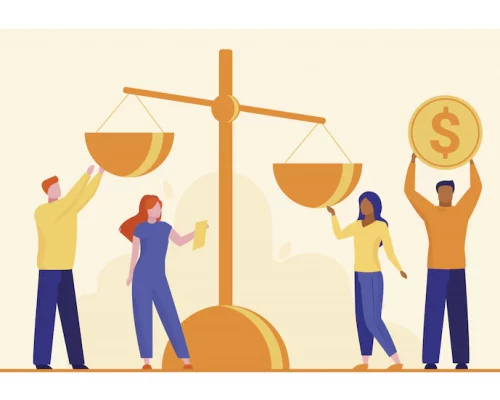We care a lot about where we stand relative to the other people, even more than our own absolute level. This is what psychologists refer to as social comparison. In a study by Clark (2003) across different cities in the UK with different unemployment rates, he predicted that if you are unemployed in an area where not many people are unemployed, it will have negative impact on you. But if you are unemployed in an area where lots of other people are unemployed, you will still be fine. We are so prone to social comparisons that even something like not having a job, depends on whether that is bad for us, depends on whether other people around us have a job or not. Even a mere act of watching TV programs can have a lasting impact on our thinking. According to O’Guinn and Schrum (1997) just watching a lot of TV (especially celebrities, fashion shows etc.) can make you less satisfied with your own salary. They also found out that if you go up in numbers of hours of TV watching, you also go down in your estimate of your own wealth relative to others. So, the more TV you watch, the more unhappy you are with your own income.
Our perceptions come from social comparisons like where the other people are in terms of salary, possessions, grades or beauty and all this lead us astray.
Our happiness is not dependent on materialistic things or what other people possess but on the experiences, we have in our life. Robbie Williams, the famous English singer, admires Elton John and went on to compete with his idol after seeing the Rocket Man’s fleet of cars. He once went on a shopping spree in Los Angeles and bought five cars in a day, including a brand-new Ferrari, a brand-new Porsche and a brand-new Mercedes even when he didn’t have a driving license. Within a week he wished he had not bought any of them. Clearly, materialistic things that we buy out of social comparisons or otherwise don’t give us the pleasure and the novelty factor fades away quickly. However, our experiences stay with us forever. A lovely trip to the mountains or a beach destination stays with us as a wonderful memory.
The problem is that all these comparisons come in for free and we cannot stop them. But these do affect our happiness all the time even if we don’t realize it. So, what is it that we can do to be happier and keep focus on our own well-being?
One technique that is useful is – The Stop Technique. This technique comes from cognitive behavioral therapy. It means that you can be mindful and catch yourself doing these comparisons. And you tell your brain, it’s not supposed to be doing that. Eg. You are like looking through an Instagram or FB feed and your mind is thinking, “Oh, this person is having such an awesome holiday, while I’m still getting bored at home.” And you notice yourself making this comparison, you just out loud say, “Stop!” And that causes your brain to take a moment to stop thinking on things. Another thing you can do is to practice gratitude. Gratitude stops our social comparison. If you experience lots of gratitude for the things that you have, you won’t have time to think about somebody else’s things and be envious. The more you practice gratitude the less likely you are to do social comparisons, because you don’t have the bandwidth to do two things at the same time. The third important thing would be to use social media platforms mindfully. Pay attention to when you get into social comparisons while using them and apply the techniques mentioned above.
One question that we all must ask ourselves – ‘do we want to be happy? Or just happier than others around us?’
I really hope you’re enjoying reading my articles. If you find the tips and insights useful, please share these articles to help spread the word and subscribe to our newsletter.


